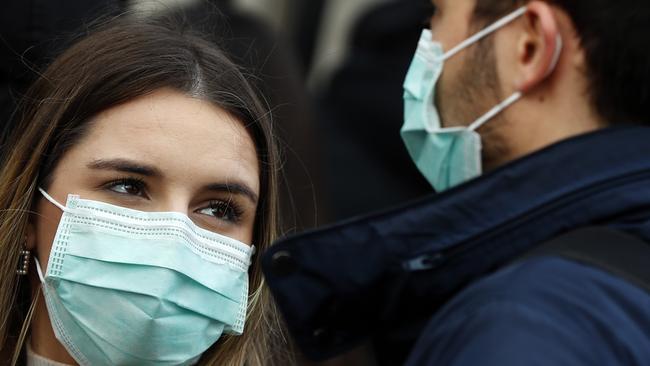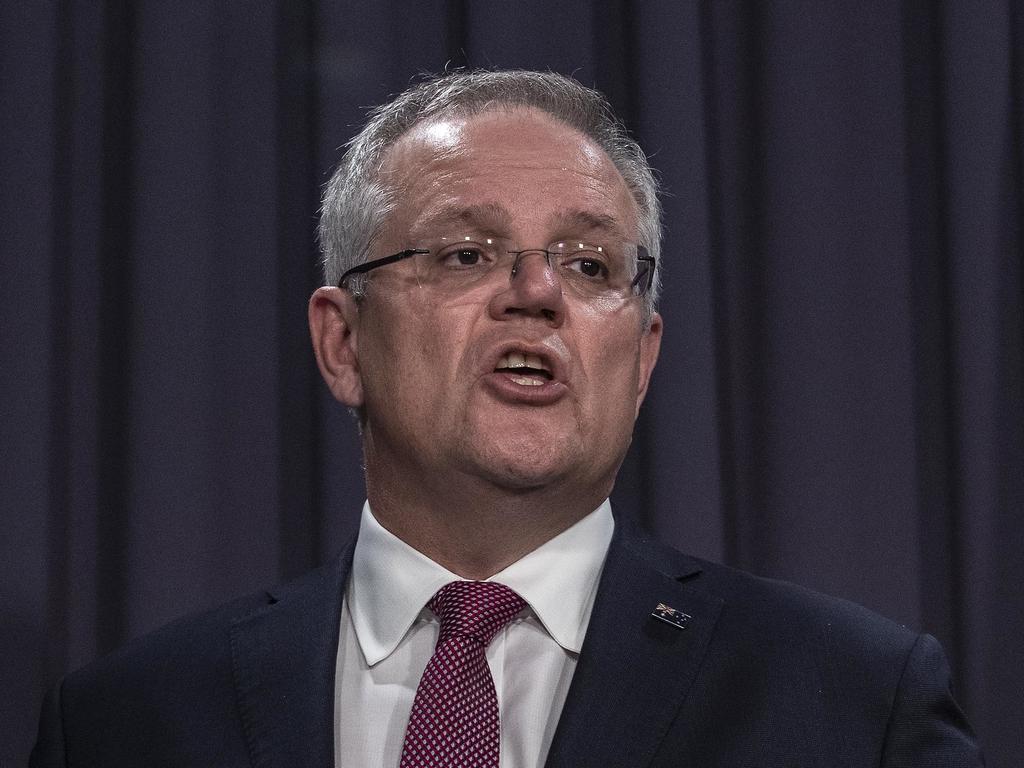Coronavirus lockdown restrictions: Can couples visit each other if they don’t live together?
Where states stand on how they impose the two-person rule in the fight against coronavirus.

Confusion has emerged over whether couples who do not live together are allowed to visit each other’s homes under heavier restrictions imposed in the fight against the spread of coronavirus.
The Victorian government has backflipped on its ban on romantic partners from different households meeting.
Early on Tuesday, Premier Daniel Andrews on Tuesday backed up his Police and Emergency Services Minister Lisa Neville in declaring that Victorians who do not live with their partners cannot visit them for social reasons.
But in the afternoon, Victorian chief medical officer Brett Sutton said an exemption would be made for partners.
Regarding ‘Stay at Home’ rules: We have no desire to penalise individuals who are staying with or meeting their partners if they don’t usually reside together. We’ll be making an exemption. Hope that helps.
— Chief Health Officer, Victoria (@VictorianCHO) April 1, 2020
Victoria’s Stage Three coronavirus shutdown legislation stipulates that a person must not permit another person to enter their place of residence unless they are a fellow resident, they have been directed to live their for self-isolation purposes, they must visit for work or education, they are attending a private real estate inspection, they are attending for medical or emergency purposes, or their entry is otherwise required by law.
Quizzed over whether this meant a ban on partners visiting each other, Mr Andrews said:
“That’s not work, that’s not care-giving, that’s not medical care, that’s not shopping for the things you need when you need them, and it does not comply with the rules. People should not do that.”
Ms Neville earlier tweeted: “You cannot visit your partner for social reasons. There are select reasons you can go to the home of your partner. They are outlined clearly in the directives of the CHO which you can find and read at: https://dhhs.vic.gov.au/coronavirus.”
You cannot visit your partner for social reasons. There are select reasons you can go to the home of your partner. They are outlined clearly in the directives of the CHO which you can find and read at: https://t.co/lZt5A46ROh
— Lisa Neville (@LisanevilleMP) March 31, 2020
“I know it does seem very harsh,” she said. “But it is part of the directive of the chief health officer based on how this virus can easily spread moving from household to household.”
Mr Andrews said people had to ask themselves whether their actions were “worth a life” before proceeding.
“If you don’t need to do it, don’t do it. That’s a very, very simple thing,” he said.
“Stay at home, preserve the health system and save lives.
“We’ve got a long way to go and I know I’m asking a lot.
“I know that people are making sacrifices across the community, but it is a price worth paying because it’s going to save lives.
“Our nurses and doctors, the whole team, they’re making big sacrifices too.
“We’ve all got to play our part, and I’m very proud of Victorians who are, and I’ve got a message for those who aren’t: you will be caught and the fines are significant, but it’s not dollars, it’s lives. That’ll be the true cost of you breaking these rules.”
NSW Police Commissioner Mick Fuller confirmed that couples are allowed to visit each other if they live in separate households.
Mr Fuller said that if your partner is not living with you, can you go to their house.
“I would put that under care. Absolutely, mental health that’s under care,” Mr Fuller said.
“We get it, that is absolutely under care,” he said.
ACT chief medical officer Kerryn Coleman announced softer “stay at home” restrictions in a public health order that mean residents can have up to two visitors.
“An occupier of residential premises must not permit more than 2 persons, other than persons ordinarily resident at the premises, to enter and remain at the premises,” the ACT order reads.
******
Here is how other lockdown rules affect you:
What does the new two-person rule mean?
All indoor and outdoor gatherings are now restricted to two people, or a group from the same household. The rules apply to both public and private places.
What if I live in a house with more than two-people?
Household members are exempt from the two-person limit. This means a family consisting of a mother, father and child who live together could go for a walk outside and not be in breach of the new limits.
People living in a share house can also go outside as a group.
If you met to exercise with someone not from your household or immediate family, it could only be the two of you.
When am I allowed to leave my house?
In his announcement of the new rules, the PM laid out a list of essential reasons you are permitted to leave your residence:
– Shopping for food, essential goods and services
– Medical reasons or compassionate needs
– To exercise (this would only be permitted if it complies with the two-person gathering limit)
– For work or study, if this cannot be conducted at home
What if I am in an at-risk category?
The federal government is recommending that people over the age of 70 and other vulnerable Australians to stay home and self-isolate. It also applies to those aged over 60 with a chronic illness and Indigenous people over the age of 50.
While the Prime Minister stressed they can still go outside, he advised they “limit contact with others as much as possible."
The NSW Premier, Gladys Berejiklian has also stressed this:
“Especially to our older Australians, the older people, if you’re over 70, you shouldn’t leave home at all,” she said. “I know this is difficult and I appreciate that for some parts of the day, people might want to get out and exercise. That is OK, so long as you don’t come into contact with anybody else.”
This is a recommendation, and not enforceable by law currently.
Can I see my family?
Yes, immediate family members are exempt from the two-person limit.
This means families split across more than one household are able to visit one another. Family members should still follow the social distancing protocols, such as one person per four square metres.
Can you move house under lockdown?
In New South Wales, the new legislation permits movement for moving house and inspecting a new home.
What about weddings and funerals?
The restrictions announced last week on numbers of attendees at weddings and funerals remain in place.
Funerals are limited to ten people and weddings to five.
What happens if I break these rules?
The National Cabinet, consisting of state and federal leaders, has endorsed these recommendations.
How they will be enforced is dependent on state and territory governments.
NEW SOUTH WALES
New South Wales police will enforce fines of up to $11,000 for those leaving home without a reasonable reason or people breaching the two-person limit. People who flout the laws could also face six months imprisonment. There will be additional fines of $5,500 for each day an offence continues.
State police commissioner Mick Fuller said people can leave their home for essential activities. These include:
– Shopping for food or other goods and services
– Exercising
– Travelling for work or education if it cannot be done at home
– Medical care (seeing a GP, going to the pharmacy)
Exemptions are in place for caring for a vulnerable person or someone in an emergency, undertaking legal obligations, accessing government services and donating blood.
10.20pm I just signed new restrictions on leaving residences. Public Health(Covid19 Restrictions on Gathering and Movement) Order 2020. Message- STAY HOME unless you need to go out for essential reasons such as work, study, obtaining food,medical supplies etc â¦@NSWHealthâ© pic.twitter.com/dsVP1IrWAo
— Brad Hazzard (@BradHazzard) March 30, 2020
VICTORIA
Victoria’s Premier Daniel Andrews has warned people face an on the spot fine of $1,600 or more for flouting the two-person rule. The state is now in “stage three” measures in its fight against coronavirus.
“If you are having friends over for dinner or friends over for drinks that are not members of your household, then you are breaking the law,” he said at a press conference.
SOUTH AUSTRALIA
In South Australia, police can issue $1,000 spots for those who breach the new laws.
ACT
In ACT, the chief minister, Andrew issued a statement that stated residents can only leave their home for essential reasons:
– Shopping for food and necessary supplies
– Medical or health care needs
– Exercising
– For work and study that cannot be done from home.
Mr Barr flagged that the first stage of enforcement would include police warning for those not complying.
QUEENSLAND
In Queensland police officers will have powers to issue on-the-spot fines of $1334 for individuals and $6,672.50 for companies, who breach these laws.
The state’s Police Commissioner Katarina Carroll insisted on-the-spot fines will be used sparingly.
Everyone who can stay home must stay home, and gatherings of more than two people are banned. There are only four reasons why you should leave home: pic.twitter.com/ya4cYJPCNy
— Annastacia Palaszczuk (@AnnastaciaMP) March 30, 2020
Queensland’s government has said its state residents should only leave their home for one of eight essential reasons:
– To obtain medical treatment or other health care services
– To purchase food or other essential goods.
– To exercise (must comply with two-person limit, unless immediate family or members of same household)
– Working for an essential employer, or if work cannot be performed at home.
– Visiting a terminally ill relative or attending a funeral
– Providing assistance to an immediate family member.
– Attending court
– Attending a childcare facility, school or university, it the education or care cannot be obtained in place of residence.
TASMANIA
The state’s lockdown measures prevent people leaving their homes unless for work that cannot be done at home, essential food or medical supplies, or exercise in groups of no more than two.
Tasmania’s Premier has flagged that police can charge those who flout the new measures.
NORTHERN TERRITORY
The territory’s chief minister, Michael Gurner has said the government would not enforce the new rule, but instead stick to the ten-person limit.
WESTERN AUSTRALIA
The WA government is introducing emergency laws in parliament on Tuesday.
The legislation will introduce $1000 on-the-spot fines for people and $5000 fines for businesses who disobey self-isolation and gathering directives. Under another bill, anyone who knowingly has or says they have coronavirus and attacks a public officer will face up to 10 years’ jail, and seven years for threats or other harm.
The new laws also mean anyone who refuses to comply with self-isolation directions could be forced to wear an electronic device or have one installed in their home. Those who continue to flout the directions, or remove or interfere with the device without a reasonable excuse face a $12,000 fine or 12 months’ jail.
The new laws will only be used during the state of emergency and will be withdrawn after one year.
Breaches of the state’s ban on interstate travel could face fines of up to $50,000, with exceptions such as for work and medical appointments.
Meanwhile, WA Police have announced the use of drones for surveillance and to deliver warnings to people not following social distancing at parks and beaches.






To join the conversation, please log in. Don't have an account? Register
Join the conversation, you are commenting as Logout